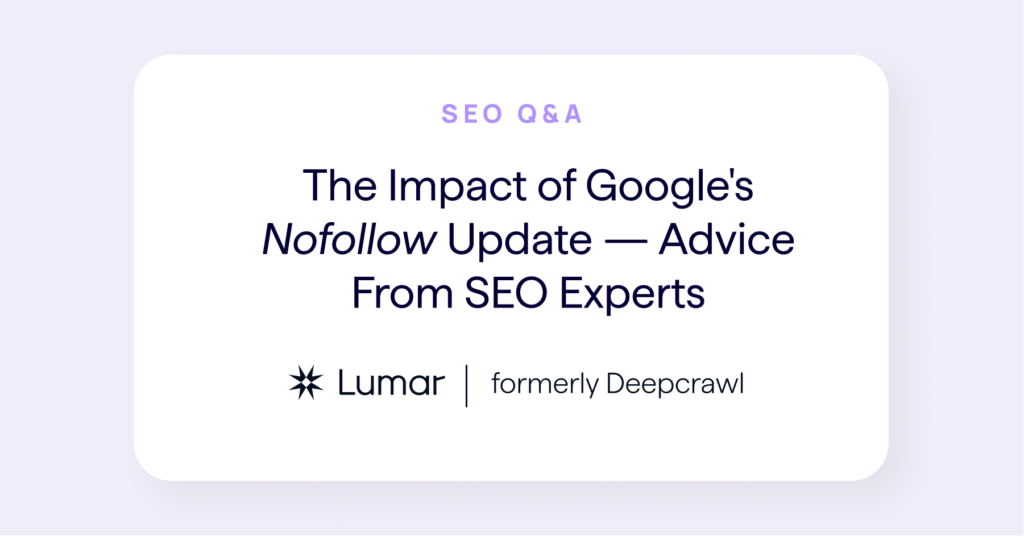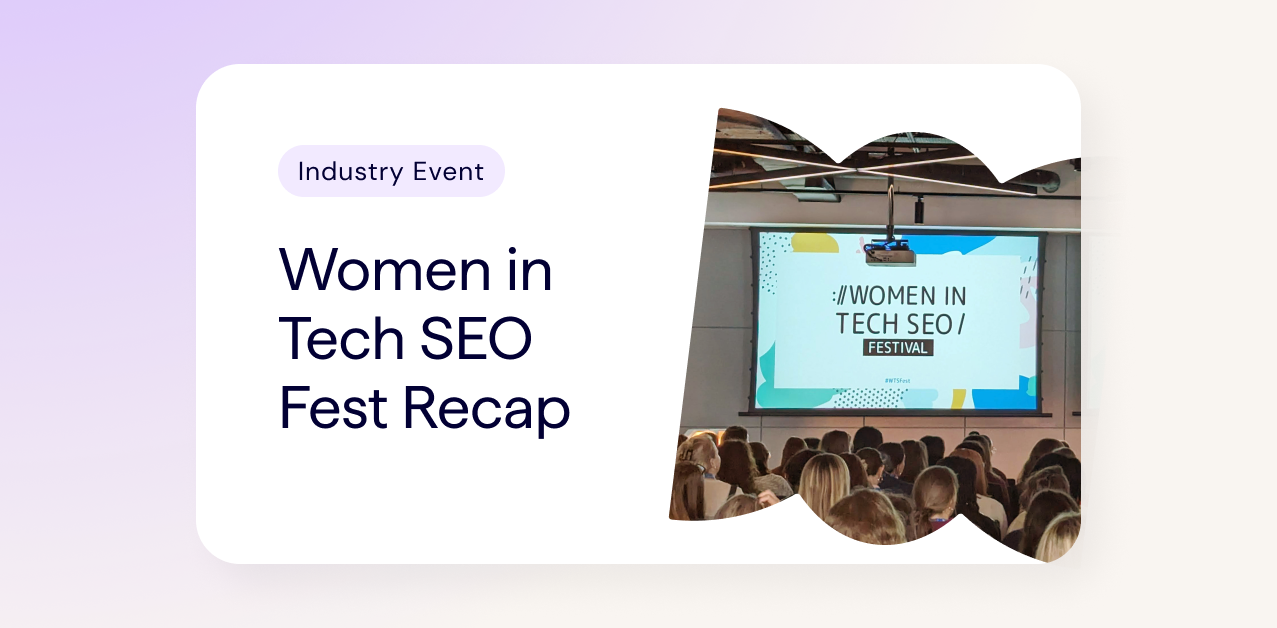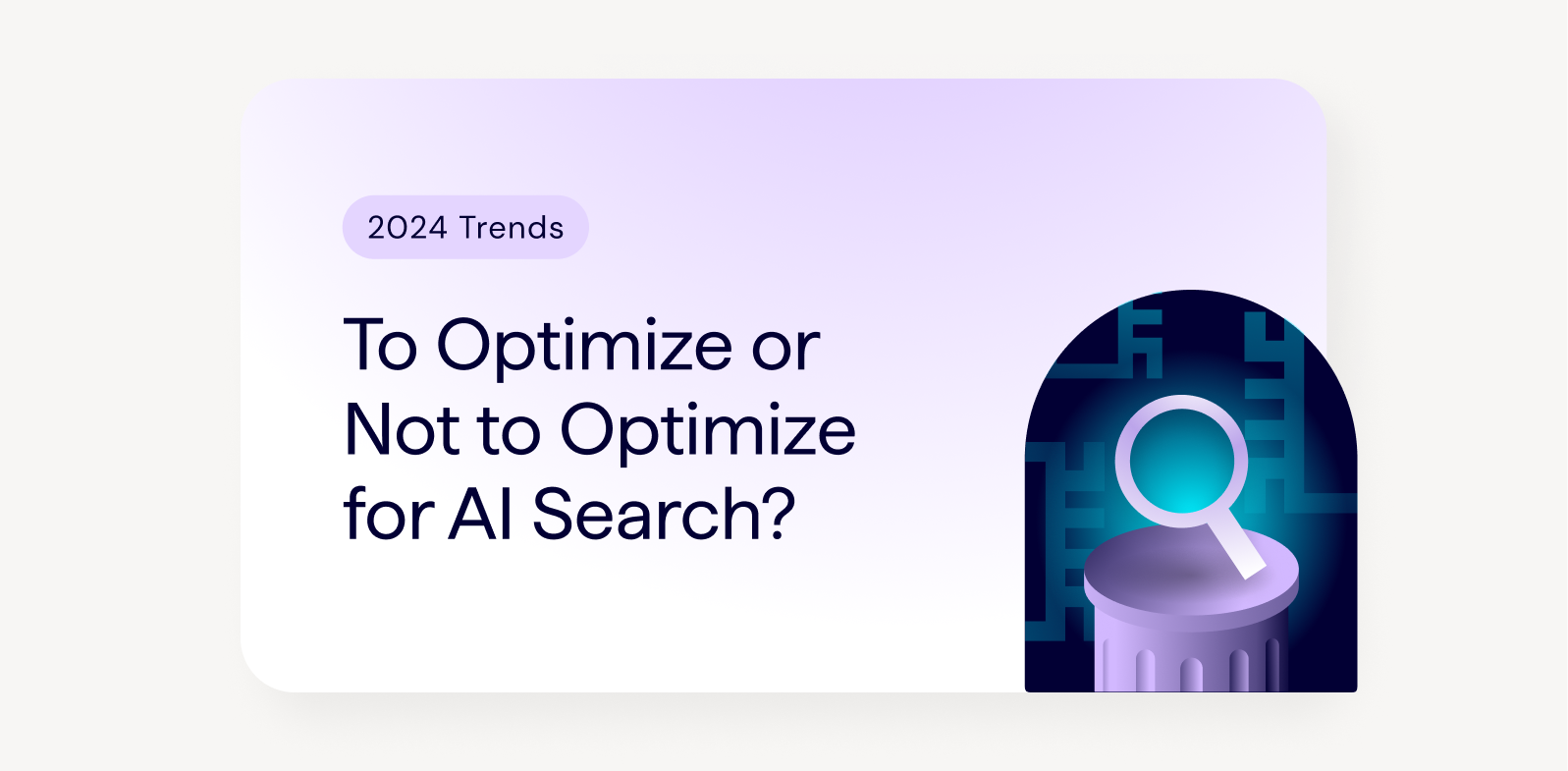On Tuesday 10 September 2019, Google announced they are evolving the way they identify the nature of ‘nofollow’ links. Google introduced the ‘nofollow’ link attribute in 2005 to help them deal with comment span, but since the web has changed significantly since then, the time has come for link attributes to be updated too. You can find out more about these changes in their announcement blog post.
How Google now deal with nofollow links
This update has led Google to introduce two new link attributes that will provide site owners with additional ways to display the nature of different links to Google. There are now three link attributes which can be used to mark up outbound links. These are:
- rel=“nofollow” – This attribute will remain the same and is used when you want to link to another page but not pass any endorsement or ranking credit to said page.
- rel=“sponsored” – The sponsored attribute should be used to identify links that are for advertisement purposes, where sponsorship and compensation agreements are in place.
- rel=“ugc” – As the attribute for User Generated Content, this value is recommended for links within user generated content sites, for example forum posts and blog comments.
In addition, all links marked with nofollow, sponsored or ugc are now treated as hints regarding which links to consider in search, as opposed to just a signal, as was used previously for nofollow. This means Google will now take these into account, along with a number of other factors, in order to better understand and analyse links within their algorithms and when ranking a site.
What is the impact of these changes?
All three link attributes are now considered as hints by Google for ranking purposes. However, they have confirmed that there is no need to change any existing nofollow links you have currently on your site, as they will still be supported.
From March 2020, nofollow attributes will also become a hint for crawling and indexing purposes. This may impact the crawling and indexing of your website, especially if you are using nofollow links as a way to prevent a page from being indexed. If this is the case, Google now recommends using one of these more robust methods, such as robots.txt and header meta tags to manage this.
Insights from SEO Experts
We asked some SEO industry experts for their thoughts on these changes, the potential impact we should be aware of and what their recommendations are going forwards.
Q – What are your thoughts on Google’s move to start using the nofollow attribute as a hint and the introduction of the UGC and sponsored attributes? What impact do you see this change having on websites in different verticals?
Bastian Grimm – CEO & Director of Organic Search, Peak Ace:
I believe this change is mainly driven by the fundamental misuse of the rel-nofollow attribute in the wild, especially in the publishing world where a lot of companies rolled out a global nofollow policy, either due to the lack of resources (manual control), knowledge or some other strange reason. Also, it solves Google’s dilemma in a sense of people arguing that nofollow doesn’t work; because having experienced how Google treats “hints” (yes, I am looking at you, canonical tag) we should all be in for even more transparency. Not.
An interesting take-away from the announcement is the fact that Google is now stating that they’ll also be looking at nofollow links for “unnatural patterns”. I mean frankly this is not really new – we’ve seen penalties solely caused by (external, inbound) nofollow links, however I believe this is quite a shake up for some SEOs who have previously believed that nofollow does actually pass value (either good or bad) – which certainly is not the case.
I find it quite entertaining that Google is apparently still not fully capable of evaluating link quality. It also emphasizes the point that links are actually “far from dead” and Google is in fact still very much relying on them. Depending on adoption, this somewhat more granular differentiation will provide Google with another nice set of training data.
Areej AbuAli – Technical SEO Manager, Zoopla
Initially, as many other SEOs felt, it was general confusion around what needs to be done, if anything. More clarification needs to be provided in terms of next steps. I do think labeling ‘nofollow’ as a *hint* is good news for link builders as it means there’s potentially value from them and introducing UGC and sponsored is a step forward in separating links gained from outreach to those that are sponsored.
Richard Barret – Senior Technical SEO Analyst, DeepCrawl
I think using nofollow as a hint was always on the cards from Google, it feels like a bit of a relic of how Google used to crawl, although it is still an important part of how websites, particularly larger websites, allow Google to move through.
Adding the UGC and Sponsored attributes is a good step towards a bit more clarity, in reality I am not sure how much of a difference it will actually make as it would require updating a lot of links for there to be much tangible difference. I don’t expect it to have much impact for most websites, could be beneficial to sites that want to support say a forum as a secondary point of contact but that don’t want that content necessarily crawled & indexed.
I think if you are already using nofollow on sponsored links I don’t think it will change anything, although it does provide a bit more clarity as to what action you should be taking if a link is a paid for placement.
My recommendations for nofollow won’t really change, if you are using nofollow to say you don’t trust a site then there is no reason to remove it, if you are using it to discourage Google from crawling pages you don’t think are worth crawling although it’s strength is now weaker it would still be a good idea to use it.
The main consideration I think for me now will be is there a better way to control the crawling so I will be running some tests on alternative methods to see if there is an effective alternative.
Ilyas Teker – Founder & SEO Consultant, Mosanta
We know that Google can now better understand whether a link is a spam or a natural link. We have done a lot of research on this subject, and the results show this. Some links may even be ignored even if they are not nofollow.
Google says if you put a link on your page that you don’t trust, put nofollow on that link. Over the years, almost every website has used nofollow for every outlink. Google may need to make some improvements at this point.
Nofollow links don’t pass page rank, but it’s still giving a signal to Google, e.g. is this link related to the article or page, providing additional value to users, etc. Google never said they would completely ignore nofollow links.
Now Google is saying that all tags (nofollow, sponsored, ugc) can be used with other ranking signals. It will be evaluated on their systems for better analysis. These two new tags will undoubtedly help Google interpret the links on the web more accurately.
Wouldn’t it be fun if every site in the world nofollows every external link? Google doesn’t want to do that from us, that’s why they try to change something about links.
The question is: Will sites that don’t use the sponsored tag be penalized for sponsored text? Or sites that have user generated content but don’t mark links as ugc?
Jenny Halasz – President & Founder, JLH Marketing
I have always felt that the no follow link attribute is unnatural. I think that the use of it became so prevalent especially amongst publishers who were afraid to link out to other sites, that it sort of broke the web. In my opinion it created a very unnatural set of patterns and signals where deserving websites were not getting the link value that they would otherwise be getting. So I believe that Google needed to change no follow to a hint to be able to count some of those links.
I am doubtful that they will get much adoption of the new link attributes unless they add some benefit or penalty associated with the use of these. However, I don’t expect any particular sites to significantly improve or fail as a result of these changes. Because they’ll be applied evenly across all sites, I expect it will be more like how a rising tide raises all ships.
Barry Adams – Founder & SEO Consultant, Polemic Digital
It’s a total mess. I feel these new link attributes are a response to a problem Google created itself. By instilling fear in publishers about putting links in their content, many sites just put a nofollow attribute on all external links regardless of the link’s intent. The result of this is a severely diminished link graph for Google to work with, which I believe has contributed to the rise of fake news sites and other non-authoritative publishers in Google’s SERPs.
Recently Google has had to roll out some very heavy-handed algorithm updates to combat this growing dominance of non-authoritative publishers in their search results, which has also had a huge negative impact for some trustworthy publishers.
Now Google is trying to find a way to address the root cause of this tangled mess, by changing the way they handle nofollow links and allowing some to carry weight. But this means they need to introduce additional tags, to help their algorithms make sense of nofollowed links and determine which should carry some value and which need to be ignored.
And of course this will have its own unforeseen consequences further down the line, leading to more mess for Google to clean up – or, more realistically, more work for publishers to try and jump through Google’s ever-changing hoops.
This is a clear example of Google using its huge dominance in search to force its own rules on the web, and thereby making the web a worse place for all.
Nick Eubanks – Founder and CEO, From the Future
It’s just further proof that Google is not able to accurately police the web and the manipulation of their search results through proactive link building. When something works, and is beyond the scope of what Google is able to control, they turn to their propaganda team to create fear, uncertainty and doubt to assist with resolution. If anything it seems nofollow links *could* be counted/valued in some sense and may lend more recognized value in some unique instances. This seems to be the most potentially damaging for affiliate sites though.
Dawn Anderson – Managing Director, Bertey
I don’t believe there is anything sinister, other than trying to make sense of a hot mess, and a rapidly growing eco-system.
Personal view: Sometimes it is enough just to be able to feed back into the eco-system and help with disambiguation if you can. Not everything has to have a self-serving value placed on it. Sometimes if you help to make things better other benefits reveal themselves much later.
Personal view: Sometimes it is enough just to be able to feed back into the eco-system and help with disambiguation if you can. Not everything has to have a self-serving value placed on it. Sometimes if you help to make things better other benefits reveal themselves much later. https://t.co/UvJzKYXsIK
— Dawn Anderson (@dawnieando) September 12, 2019
Bartosz Góralewicz – CEO, Onely
I believe that Google’s move to start using the nofollow attribute as a hint has been in motion for quite a while now. The recent announcement from Google isn’t really changing too much in terms of the daily work of SEOs or publishers. I think that a lot of people are overreacting without fully understanding (and reading) Google’s post. There are two factors here that have to be stressed:
1. UGC/sponsored attributes are OPTIONAL. If a webmaster or website owner feels that it may be beneficial for them, they can use it.
2. There is no harm in keeping things “as they are”.
That being said, I don’t think there is any impact for most of us.
Laura Hogan – Owner, Jellybean Agency
I think that the addition of UGC and Sponsored is a really positive move as too often we’ve seen websites blanket no-follow all external links, often out of fear and a lack of understanding. This gives a lot more clarity to the context of the link in question and what (if any) SEO value is should have.
I don’t see this having a big impact in changes needed to sites for a lot of verticals – publishing, blogs and forums will be the big ones for initial changes and adopting these new attributes.
It’ll definitely be interesting to see if there’s any ranking changes for sites which previously had their published sponsored content attributed as no-follow and now changed to sponsored. If sites see ranking drops this could impact the commercial model for publishers in how they sell their sponsored content too.
Fili – SEO Expert, Search Brothers
It is an interesting development and certainly one deserving closer scrutiny. The most important question to answer, which Google fails to deliver in their public statement is “why the change?”. Like with the introduction of the Disavow Tool some years back the official lingo is likely to revolve around webmaster empowerment and better understanding context in order to deliver yet more accurate results to users. That is but one side of the coin however.
The introduction of rel=”sponsored” for commercial links and of rel=”ugc” for user placed links over time, as it becomes widespread will allow Google to much more precisely identify link intention and quality. That, then more refined, link data will indeed be useful to first and foremost train algorithms and in the long run to deliver better Google Search Results to users.
In addition, nofollow references may now be followed for Page Rank purposes as Google has switched with these new link attributes and the historic rel=”nofollow” to interpret them as hints rather than as rules, as it did in the past. This is particularly interesting as I can see rel=”nofollow” now being used and/or promoted by link builders for external Page Rank focused link building campaigns. As such, expect more link building spam emails coming to your inbox.
Darren Kingman – Founder, Root Digital & Hannah Butler – Technical SEO Consultant, Root Digital
I think Google (finally) recognised that the nofollow attribute was being widely used across major news publications incorrectly as a blanket approach to all external links. That’s far from what its original intent was and it likely got to the point where Google recognised it was impacting their search results. The change to a hint offers them the wiggle room to choose if a link should pass value or not, and in the case of the natural mentions on major news publications, that’s exactly the use case we can see Google (quite easily) starting to pass value and it impacting the SERPs as a result.
Where we suspect there won’t be a change, is in the nofollow links provided as part of press releases or comments. The attribute will most likely still be upheld there, but where Google know the link is provided in the body copy of a unique article, that’s a really easy element to discern and pass value.
Q – Will these changes impact the way you use or recommend using nofollow for the sites you manage and will you be using the new UGC and sponsored link attributes?
Areej AbuAli – Technical SEO Manager, Zoopla
At this stage, no. I won’t recommend site owners to change the way they are currently using the ‘nofollow’ attribute. But if required in specific cases, I would recommend the use of ‘UGC’ and ‘sponsored’ link attributes.
Barry Adams – Founder & SEO Consultant, Polemic Digital
No. I believe these new link attributes are a waste and for the time being I’ll advise my clients to ignore them.
Ilyas Teker – Founder & SEO Consultant, Mosanta
Of course, we’ll suggest to our clients to use sponsored and UGC tags for their links. It’s an excellent opportunity to see the changes after this implementation. If we rank better, it means something is happening or opposite action is occurring. We’ll see the bigger picture after several months, not quickly. Nobody knows what will be next in a short period.
I hope Google improves the algorithm even more, and links are not so vital.
Nick Eubanks – Founder and CEO, From the Future
I will not be using these nor recommending their use, unless Google wants to pay me to support their business objectives.
Jenny Halasz – President & Founder, JLH Marketing
I do not expect these changes to make any change in what I recommend to my clients. Most of my clients are large to enterprise, and it’s hard enough to get development time for SEO priorities. Unless Google makes the adoption of these link attributes mandatory in some way, I expect my SEO strategy will always have higher priorities.
Bartosz Góralewicz – CEO, Onely
As a technical SEO agency working with enterprise clients, the first question we ask is if anything we recommend is worth implementing for our client. The ROI on each change has to be positive. We definitely won’t be sending our clients recommendations to change link attributes sitewide as an extra task as development time is way too expensive to be implementing changes that don’t affect visibility. We may take new attributes under consideration when working on website redesigns where the cost of the implementation of UGC/sponsored attributes is incremental.
That being said, we need to assume that Google is asking webmasters to use new attributes as part of the training data set for machine learning. I think that I speak for most technical SEOs – this may become obsolete soon just like the rel-author tag. This is a controversial change; however, it is not going to affect webmasters and SEOs (positively or negatively) and frankly, I think this is the only reason why so many SEOs are talking about it.
Fili – SEO Expert, Search Brothers
This change is likely to have some, most likely limited impact on the way backlink risks are evaluated, as it will take some time for adoption. With this announcement Google unfortunately decided unilaterally to change how website owners should use nofollow without making this a joint effort with other search engines such as Bing (as they have done in the past with the canonicals and sitemaps). As such, for other search engines which do not copy yet these new guidelines from Google, we will need to keep using a combination of nofollow and one of the new attributes, or just keep using nofollow only. Keep in mind that the only benefit to start using the new attributes is for Google only for the time being. Don’t prioritize implementing these new link attributes over other more important SEO action items for now.
Laura Hogan – Owner, Jellybean Agency
I don’t foresee these changes making a huge impact to the day to day of our clients. For any client that has banner ads, we’ll get these changed to sponsored as it’s a quick job. If they have a forum or comments section and can easily make a blanket change to the attributes we’ll get that implemented, but until there’s some strong cause and effect case studies with the new attributes we won’t be suggesting mass developer time is spent on this.
We don’t push sponsored content within our strategies as we use Digital PR for the majority of our link building (so I’m not concerned about the attribute change)… who knows maybe some publishers will actually start to remove no-follow and actually use normal links in PR coverage…. Now that’d be the dream!
Darren Kingman – Founder, Root Digital & Hannah Butler – Technical SEO Consultant, Root Digital
Quite honestly, over the years, whenever a client has worked on a piece of content that includes external reference, we’ve largely defaulted to a ‘follow’ attribute. Being SEO’s and link builders, we know it’s one of the fundamental signals powering how search engines work so have wanted to uphold that integrity. It wouldn’t make much sense if we were fighting for follow links in our external placements and yet using nofollow ourselves!
With that in mind, we will be recommending the sponsored link attribute when a sponsorship opportunity arises for a client. There are clearer use cases with the new attributes and we’ll certainly be recommending them where they fit.
Nick Wilsdon – Search Product Owner, Vodafone
It’s important to realise that better defining our link attributes will have no commercial uplift – Google have confirmed this. This change will help Google better understand the web but will not contribute to our traffic or commercial targets.
- You should be aware of which sections across your domains, could make use of these changes, i.e. forum. However, unless these changes can be simply fed into best-practice guidelines then I would strongly suggest we do not spend time/resource here. This change is targeted towards large news publishers or websites with a particularly high level of UGC, such as Wikipedia.
- If you are using “no-follow” to help keep content out of Google, i.e. within faceted menus, you should review this deployment. You should use more robust methods, such as noindex to achieve these objectives.
- As the link attribute “no-follow” will be taken as a hint rather than a directive from March 2020, we may possibly see a (positive) change of rankings following this date. You should be able to monitor this through our SEO toolsets.
This update has certainly sparked conversation within the SEO industry, with most SEOs wondering if it is worth implementing these new attributes. Given the information, Google have released and the insights from others working within SEO, it certainly seems like this decision is one each team should make for themselves, depending on their industry and the potential impact.
Time will tell before we start to see any real impact from these changes, but we will certainly be keeping a close eye on this over the next few months.





